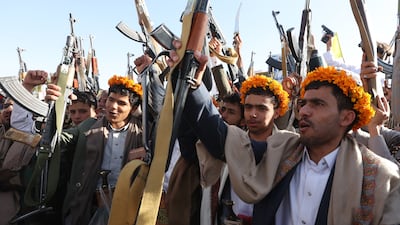One of the regional consequences of Israel’s brutal response to the devastating attacks of October 7 has been the hundreds of violent attacks against international shipping by Yemen’s Iran-backed Houthi militants. Publicly positioned as action in support of the Palestinian people, a closer look reveals a campaign that looks more like a mafia shakedown than an act of solidarity.
This week, The National published its latest investigation into the Houthis’ destabilising actions in the Red Sea. Despite repeated western air strikes on Houthi-controlled territory and the presence of a western-led coalition of naval firepower, civilian ships travelling through this vital waterway remain vulnerable to the rebels’ missiles, drones and gunfire.
The effects are wide-ranging, but the rebels are said to be making hundreds of millions from shipping companies to ensure safe transit. In October, the UN Security Council heard that the Houthis are earning nearly $2.2 billion a year by “allegedly collected illegal fees from a few shipping agencies to allow their ships to sail through the Red Sea and the Gulf of Aden without being attacked”.
But to truly understand the realities of this 21st century piracy, it is important to hear the voices of the many ordinary seafarers whose lives have been put in danger. One such figure is Avhilash Rawat, the 40-year-old captain of the Marlin Luanda, a ship that was carrying more than 84,000 tonnes of a highly flammable and volatile liquid mixture called naphtha. A Houthi missile strike left the ship ablaze, with flames five metres high. Cpt Rawat organised a 20-hour firefighting operation that saved the lives of his crew.
Other seafarers have been less fortunate. In March, three crewmen on board the bulk carrier True Confidence were killed and at least four wounded in a missile attack and the crew of the Galaxy Leader are still being held hostage in Yemen more than a year after Houthi fighters boarded and seized their vessel.
And it is not just commercial shipping that is affected. The rising cost and physical risk of sending aid and supplies through the Red Sea were highlighted by 26 humanitarian NGOs in January. Three months later, the International Rescue Committee said a decision by its carrier to suspend operations in the Red Sea had forced the charity – which has been supplying vital aid to civilians in war-torn Sudan – to seek alternative routes.
Amid growing reports that a ceasefire in Gaza may be within reach, it is germane to ask what kind of settlement would be acceptable to a rebel movement 2,000km away – especially one that has been accused by the Security Council of striking civilians and civilian infrastructure in Yemen as well as implementing a “policy of sexual violence and oppression”.
If, as the October report suggests, the Houthis’ campaign of violence is so lucrative, it remains to be seen if their cynical policies of intimidation in the Red Sea will continue. So far, the Houthis’ opportunism in relation to the suffering of the Palestinian people has forced the region and international community to deal with its agenda. Bringing the Gaza crisis to an end would be the best way of removing the Houthis’ excuse for their bullying behaviour in the Red Sea.


